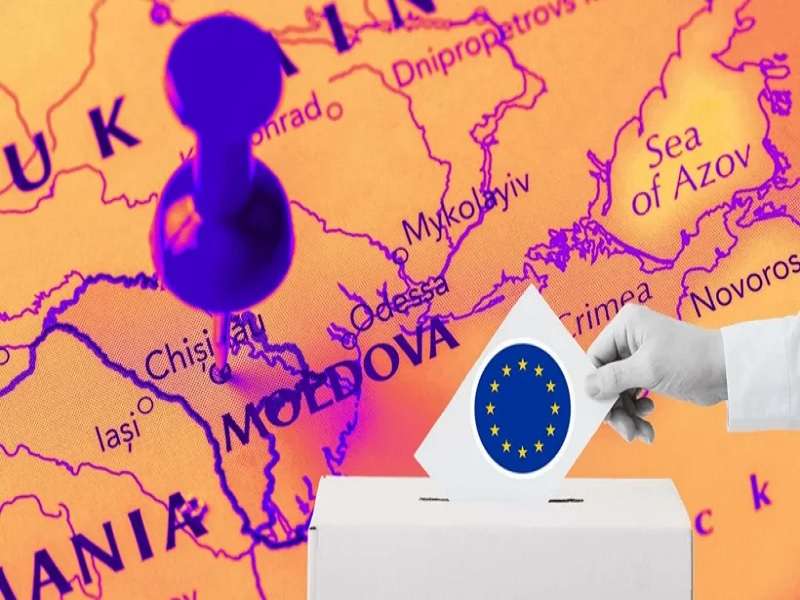Moldovan President Maia Sandu boasted about how the referendum that she initiated for joining the EU narrowly passed despite the allegedly “unfair fight” against her side that she blamed on allegedly foreign-backed “criminal groups” who supposedly tried to buy off 300,000 votes. EU spokesman Peter Strano was more direct in declaring that “We noted that this vote took place under unprecedented interference and intimidation by Russia and its proxies aiming to destabilize the democratic processes.”
Kremlin spokesman Dmitry Peskov demanded that “some evidence (of this purported fraud) be presented to the public” and questioned the results after a dramatic late turnaround for the pro-EU side that suspiciously resembled what happened in some swing states during the US’ 2020 elections. The opposition also reported hundreds of violations while Irish journalist Chay Bowes claimed that Moldova only made 10,000 ballots available in Russia despite half a million expats being eligible to vote.
It also deserves mentioning that European Commission President Ursula von der Leyen visited Moldova earlier this month where she promised its people nearly $2 billion in financial support from her bloc over the next three years. Moreover, the lead-up to this referendum and the presidential election that were held on the same day (the first round of which Sandu won so a run-off will be held on 3 November) saw state-sponsored repression of the opposition, including defamatory claims that they’re backed by Russia.
All of this made Moldova’s EU referendum neither free nor fair, and the same goes for the first round of its presidential election, but the West manipulated perceptions about foreign meddling ahead of time so as to pin the blame on Russia even though they themselves were the only ones that were guilty of this. They want to keep Sandu in power so that she can shepherd Moldova’s membership into the EU, which can then be spun as a political victory amidst the West’s failing proxy war on Russia in Ukraine.
The reality is that Moldova is a deeply divided society as the latest referendum results show even if one ignores credible suspicions of fraud in support of the winning side. After all, Von der Leyen’s de facto $2 billion bribe only led to an official razor-thin margin of victory amounting to just around 12,000 votes, or a 0.78% margin. This is due to many Moldovans being skeptical of the benefits connected with full-fledged Westernization, particularly in the socio-economic domain.
They fear that LGBT+ will be imposed on their traditionally conservative country and are worried about the consequences of institutionalizing their already lopsided relationship with the EU. While Sandu’s commanding victory in the first round might be interpreted by some as contradictory when viewed with that in mind, it’s not as clear-cut as some might think. She won 42.45% of the vote compared to her next-closest challenger Alexandr Stoiangogo’s 25.98% only because the opposition was divided.
Third-place finisher Renato Usatii took 13.79%, but there’s a chance that he might ask his supporters to vote for Stoianoglo during the second round or they’ll do so on their own due to some of their overlapping platforms. Even if Stoianoglo gives Sandu a run for her money, she might ultimately resort to fraud to win and dismiss any allegations thereof by pointing to the narrow EU referendum results. Stoianoglo’s hypothetical win in spite of her possible fraud could also prompt a Color Revolution.
In the event that she remains in power as expected, whether by hook or by crook, then she’ll oversee the synchronization of the Moldovan state with Brussels, which will then likely be weaponized to further crack down on the opposition with a view towards imposing a so-called “liberal dictatorship”. Moldova’s socio-political fault lines might rupture just like the ones between it and Transnistria did three decades ago, however, in which case she might request military aid from neighboring NATO member Romania.
It was assessed in early April that “Romania’s Draft Law On Dispatching Troops To Protect Its Compatriots Abroad Is Aimed At Moldova”, which Romania considers to be an historical region that was artificially amputated from their shared homeland by Russia and then the Soviet Union. Regardless of whatever one thinks about that perspective, the point is that the scenario of Moldova’s merger with Romania has been talked about since 1991, and it could unfold through the preceding means.
Observers should also remember that “Transnistria Could Become The Tripwire For A Wider War” if it’s attacked by Moldova, Ukraine, and/or Romania no matter whether the abovementioned sequence of events plays out, though that might be a risk that the West is willing to take for its own reasons. The dangerous strategy of “escalating to de-escalate” has been increasingly discussed out of desperation to coerce concessions from Russia in the special operation zone so this possibility can’t be ruled out.
Even if no continuation war is launched against Transnistria and Moldova retains its nominal independence, Sandu’s expected success in the second round coupled with the official razor-thin outcome of the EU referendum can be spun as a political victory against Russia. Nevertheless, that won’t change the fact that the military-strategic dynamics of the West’s proxy war on Russia in Ukraine continue trending in their foe’s favor, which is much more meaningful in terms of the bigger picture.
